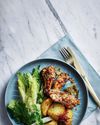
Addiction is not just messy drunks, cokeheads or junkies. The biochemical reality is we can become addicted to many things that are much more subtle and that are so socially acceptable, we’d happily give them to toddler. Our brains operate a biochemical reward system to make us get off our bottoms and do stuff that keeps us alive long enough to produce the next generation. Without it, we wouldn’t get out of bed, we wouldn’t eat even if food was put in front of us, we wouldn’t go to the trouble of meeting other people and certainly wouldn’t bother getting to know them well enough to have children with them. This same system keeps us safe from danger by providing us with the motivation to run away or stand and fight.
Good things
That reward system, however, can be broken. We can like things too much for our own good. I was addicted to sugar. I didn’t know I was addicted to sugar until I wasn’t. Had you asked me at the time, I would have denied it till the cows came home – and then bought a Coke instead of water because it was more ‘fun’. When I compare the way I felt about food before to the way I feel about it now, I definitely was. Sugar pushes exactly the same biochemical buttons in our reward system as cocaine, alcohol, nicotine and many others. Just because the cravings are less intense and it has stayed under the regulatory radar doesn’t mean the biochemistry is any different or it is not addictive.
This story is from the July 2021 edition of Australian Women’s Weekly NZ.
Start your 7-day Magzter GOLD free trial to access thousands of curated premium stories, and 9,000+ magazines and newspapers.
Already a subscriber ? Sign In
This story is from the July 2021 edition of Australian Women’s Weekly NZ.
Start your 7-day Magzter GOLD free trial to access thousands of curated premium stories, and 9,000+ magazines and newspapers.
Already a subscriber? Sign In

PRETTY WOMAN
Dial up the joy with a mood-boosting self-care session done in the privacy of your own home. It’s a blissful way to banish the winter blues.

Hitting a nerve
Regulating the vagus nerve with its links to depression, anxiety, arthritis and diabetes could aid physical and mental wellbeing.

The unseen Rovals
Candid, behind the scenes and neverbefore-seen images of the royal family have been released for a new exhibition.

Great read
In novels and life - there's power in the words left unsaid.

Winter dinner winners
Looking for some thrifty inspiration for weeknight dinners? Try our tasty line-up of budget-concious recipes that are bound to please everyone at the table.

Winter baking with apples and pears
Celebrate the season of apples and pears with these sweet bakes that will keep the cold weather blues away.

The wines and lines mums
Once only associated with glamorous A-listers, cocaine is now prevalent with the soccer-mum set - as likely to be imbibed at a school fundraiser as a nightclub. The Weekly looks inside this illegal, addictive, rising trend.

Former ballerina'sBATTLE with BODY IMAGE
Auckland author Sacha Jones reveals how dancing led her to develop an eating disorder and why she's now on a mission to educate other women.

MEET RUSSIA'S BRAVEST WOMEN
When Alexei Navalny died in a brutal Arctic prison, Vladimir Putin thought he had triumphed over his most formidable opponent. Until three courageous women - Alexei's mother, wife and daughter - took up his fight for freedom.

IT'S NEVER TOO LATE TO START
Responsible for keeping the likes of Jane Fonda and Jamie Lee Curtis in shape, Malin Svensson is on a mission to motivate those in midlife to move more.